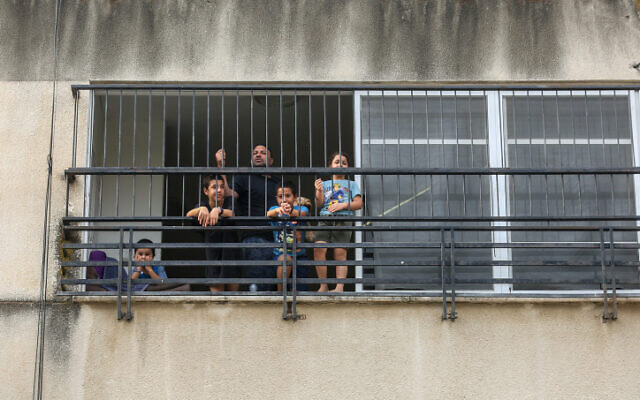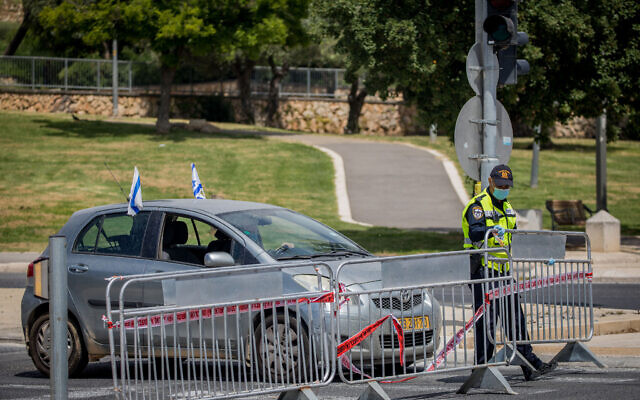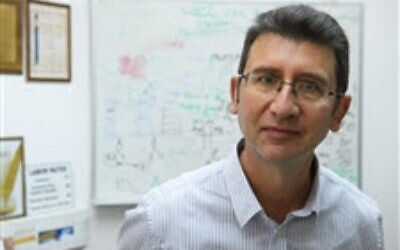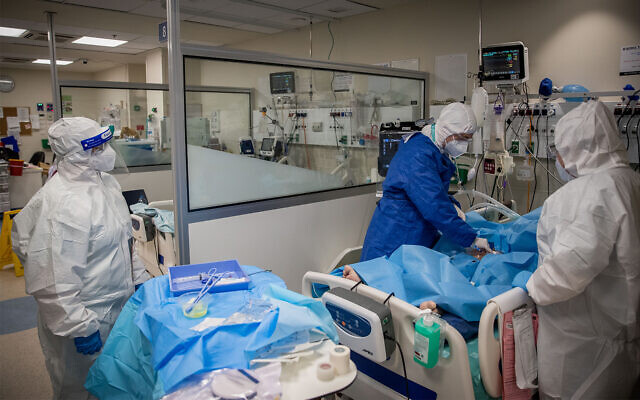Open letter from some 90 doctors and researchers, including Nobel laureate in Chemistry, urges Israel to adopt Swedish model and try to reach herd immunity while shielding elderly
TOI STAFF Today,

A father seen with his kids at home after the cabinet voted not to open schools in hot zones, in the northern Israeli city of Tiberias, September 1, 2020. (David Cohen/Flash90)
Dozens of doctors and scientists have launched a campaign urging the government not to impose a new lockdown, claiming that fears over the coronavirus pandemic are overblown and that the economic damage from such a move will prove too high a cost to bear.
Among the approximately 90 doctors and researchers to sign an open letter warning against a general closure are Nobel Prize in Chemistry winner Michael Levitt and the directors of the emergency wards or coronavirus wards of several hospitals.
In the letter, the experts warn that a lockdown is only a temporary measure that does not stop the virus but only delays it, thereby drawing out the damage caused by the pandemic and putting more people in danger.
“Given the large amount of information piling up about the low danger of mortality among the healthy population, and given the lack of certainty about the the efficacy and safety of a vaccine being developed soon, and in light of the research done until now, it’s clear that the best way to get out of the crisis quickly with a minimum of death (and also damage to health and the economy) needs to center on developing deep immunity by preventing the elderly population at risk from being infected,” the letter reads.
“A closure is thus a strategic mistake, based on a lack of basic understanding of the mechanisms of a pandemic,” it adds.
Among the policy recommendations are developing a model tried out by Sweden, which avoided a lockdown and imposed only a minimal suite of restrictions in a bid to develop herd immunity, which occurs when enough of a population develops antibodies that infection rates drop to insignificant levels.
As of Sunday, Sweden had just under 85,000 confirmed cases, and over 5,800 deaths. While some have pointed to the high death toll as a result of the country’s lax approach, health officials in Stockholm maintain that it’s unclear whether a lockdown would have led to significantly fewer numbers.
People chat and drink in Stockholm, Sweden, April 8, 2020. (AP/Andres Kudacki)<
>
<
>
While the letter writers admit that Sweden made some policy errors, they also claim that the Swedish population is more susceptible to the disease due to a higher median age and other factors, indicating that Israel would fare even better under the model.
“We are calling for taking the possibility of a lockdown off the table. At the same time, we are calling to line up Sweden’s policies with Israel’s reality by diverting infections away from at-risk groups toward those not at risk,” the letter reads.
The letter would appear to run against recommendations by experts at the World Health Organization and many government officials in Israel.
Lockdowns in China and elsewhere, which kept people at home and unable to infect others, have been credited with helping nearly eradicate the disease in those countries.

Police at a roadblock on a road enforcing a lockdown due to the coronavirus outbreak, Jerusalem, on April 29, 2020. (Yonatan Sindel/Flash90)
<
>
Among the signatories was Levitt, who won the Nobel Prize in Chemistry in 2013.
Michael Levitt (photo credit: CC BY Wikipedia)<
>
Levitt has a history of downplaying the virus, in March telling the Kan public broadcaster that he would be surprised if more than 10 people died from the virus in Israel. On July 25 he said the pandemic would be finished in the US in four weeks with a total number of reported deaths below 170,00, a figure he admitted on August 25 was too low an estimate (On September 7, the US reported death toll from COVID-19 stood at 188,941, according to data from Johns Hopkins University).
Also included were the heads of emergency and coronavirus units at several hospitals in Haifa, Afula and Netanya.
One signatory was Dr. Amir Schachar, the head of the emergency wing at Laniado hospital in Netanya, which has recently seen a large outbreak within the hospital’s geriatric ward, reportedly stretching its resources.
Schachar told Channel 12 news that his hospital was having no issues dealing with the caseload.
“We know how to deal with seriously ill patients, the mortality rate is not out of the ordinary in comparison to other viral diseases, and the hysteria is totally unnecessary,” he said.

Prof. Mark Last (Dani Machlis/Ben Gurion University)
Prof. Mark Last, another signatory who is the head of Ben-Gurion University’s Department of Software and Information Systems, recently told The Times of Israel that he believed Israel was nearing herd immunity, calculating that 9 in 10 cases had gone unreported.
“We should be at the peak within the next two or three weeks, and start a slow decrease in the number of new cases, assuming there is no change in the current restrictions,” he said last week.
As of Monday morning, Israel had recorded over 130,000 cases overall, with the tally growing by between 1,500 and 2,500 daily for the past several weeks, depending on testing numbers.
The death toll stands at 1,019. Of the 27,148 active cases, 453 patients are in serious condition and 131 people are being treated with ventilators.
Israel’s transition government imposed harsh lockdown measures during the initial wave of the virus, managing to bring daily case numbers down to a couple dozen a day in May, but since then has seen the pandemic spread at an unprecedented pace, making it one of the most infected countries per capita in the world. Officials have blamed the swift re-opening of schools and other services, a weak contact tracing system and dwindling public will to maintain guidelines for the spike over the last several months.
Shamir Medical Center personnel at the hospital’s coronavirus ward of Shamir in Be’er Ya’akov, near Tel Aviv, August 20, 2020. (Yonatan Sindel/Flash90)<
>
<
>
On Sunday night, the government pulled back from its plans to impose lockdowns on certain cities with especially high infection rates, instead imposing nighttime curfews on some 40 towns during which non-essential businesses will have to close. Schools in the cities will be shut indefinitely.
The decision to backtrack from the plans for a lockdown came after heavy pressure from the ultra-Orthodox community, which saw the inclusion of several ultra-Orthodox areas on the roster of hot zones as a form of discrimination.
Officials insist a nationwide lockdown is still a possibility, especially over the upcoming High Holidays.






See also in Today’s Arutz Sheva: “UCLA, Stanford study:
‘For average 50-64 year old, chances of dying from COVID-19 are 1 in 19.1M’
New study finds chances of contracting or dying from coronavirus much lower than previously thought.”
From Today’s Arutz Sheva> “‘The hospitals aren’t collapsing, there’s no need for lockdowns’ – Inside Israel
The Knesset’s Coronavirus Committee held a deliberation Monday on the possibility of imposing a second nationwide general lockdown.
The committee hearing, led by Committee Chairwoman Yifat Shasha-Biton (Likud), assessed the costs and benefits of a possible lockdown, which Prime Minister Binyamin Netanyahu said would likely be discussed by the government this Thursday, Walla reported.
“We want to understand whether Israel really needs another lockdown, when it is clear to everyone what the consequences will be.” MK Shasha-Biton said.
“For a pretty long time we’ve had the threat of a general lockdown hovering over us, amid claims that we’re our epidemiological system necessitates it. Yet the more we’ve seen here the statistics, we have seen that they aren’t dramatic.”
“Even this increase [in fatalities] that we’re seeing is actually very small in proportion to the number of diagnosed cases. Last week there was a sense that we’re on the edge of a catastrophe. It is important to point out that the increase in the number of confirmed cases follows an increase in the number of tests administered.”
Dr. Amir Shahar, chief of the emergency care department at Laniado Hospital in Netanya, said that the numbers of diagnosed patients, of patients in serious condition, and the number of patients on respirators has been stable for a number of weeks, and that the healthcare system is not on the verge of collapse as a result of the pandemic.
“I would like to ask the Health Ministry what facts and statistics it bases it decisions to push methods to curb the spread of the virus,” said Dr. Shahar.
“As of right now I count 131,000 [total diagnosed cases] and a bit over 1,000 deaths, which is about a 0.7% fatality rate. That is the level of fatalities of the flu. So what is the threat to the general population? What are we so afraid of?”
The committee also heard from Prof. Udi Kameron, a lecturer at Tel Aviv University’s School of Medicine and a researcher of infectious diseases.
Prof. Kameron noted the projections earlier this year of higher levels of morbidity and fatality rates, which overestimated the actual death rates of the coronavirus, and discussed Sweden’s handling of the pandemic, saying that there is no need for a lockdown.
“We put together a letter in support of the Swedish model,” said Prof. Kameron. “In March, we were told that this was the pandemic of the century and that 100,000 people would die. That did not happen. It wasn’t even close to happening and it won’t happen.”
“In April, Sweden and Britain were confronted by the dilemma of either imposing lockdowns or preserving personal freedom and having limited restrictions. Britain went with the lockdowns, Sweden went with its own approach – and people predicted Sweden would have 100,000 fatalities. Now we see that there are barely any deaths there.”
“We need to stop with this fear mongering and to take [lockdowns] off the agenda.”
Earlier on Sunday, some health officials warned that Israel’s healthcare system is at risk of being overwhelmed if the coronavirus pandemic continues through the upcoming flu season.
According to a report Monday morning in the Hebrew daily Ma’ariv, several senior health officials warned that hospitals are already having trouble handling the increased number of coronavirus patients in serious condition, and will be further strained if the pandemic continues to escalate when the flu season begins.
Dr. Ze’ev Feldman, the chairman of the Irgun Rofei Ovdei HaMedina (ARAM) – which represents doctors working in the public healthcare system – and chief of Sheba Medical Center’s children’s neurosurgery department expressed concerns over the growing number of serious cases of the coronavirus and the continued increase in the number of fatalities each week.
On Sunday, the Ministerial Committee for Legislation voted to impose daily 12-hour curfews on 40 cities and towns across Israel which have high coronavirus infection rates. Most of the communities in question are either Arab-majority or haredi-majority towns.
Under the curfews, which last every day from 7:00 p.m. to 5:00 a.m., businesses in the affected towns will be required to close, with the exception of businesses providing ‘essential services’.
Schools will be closed in the 40 towns and cities included in the order.”